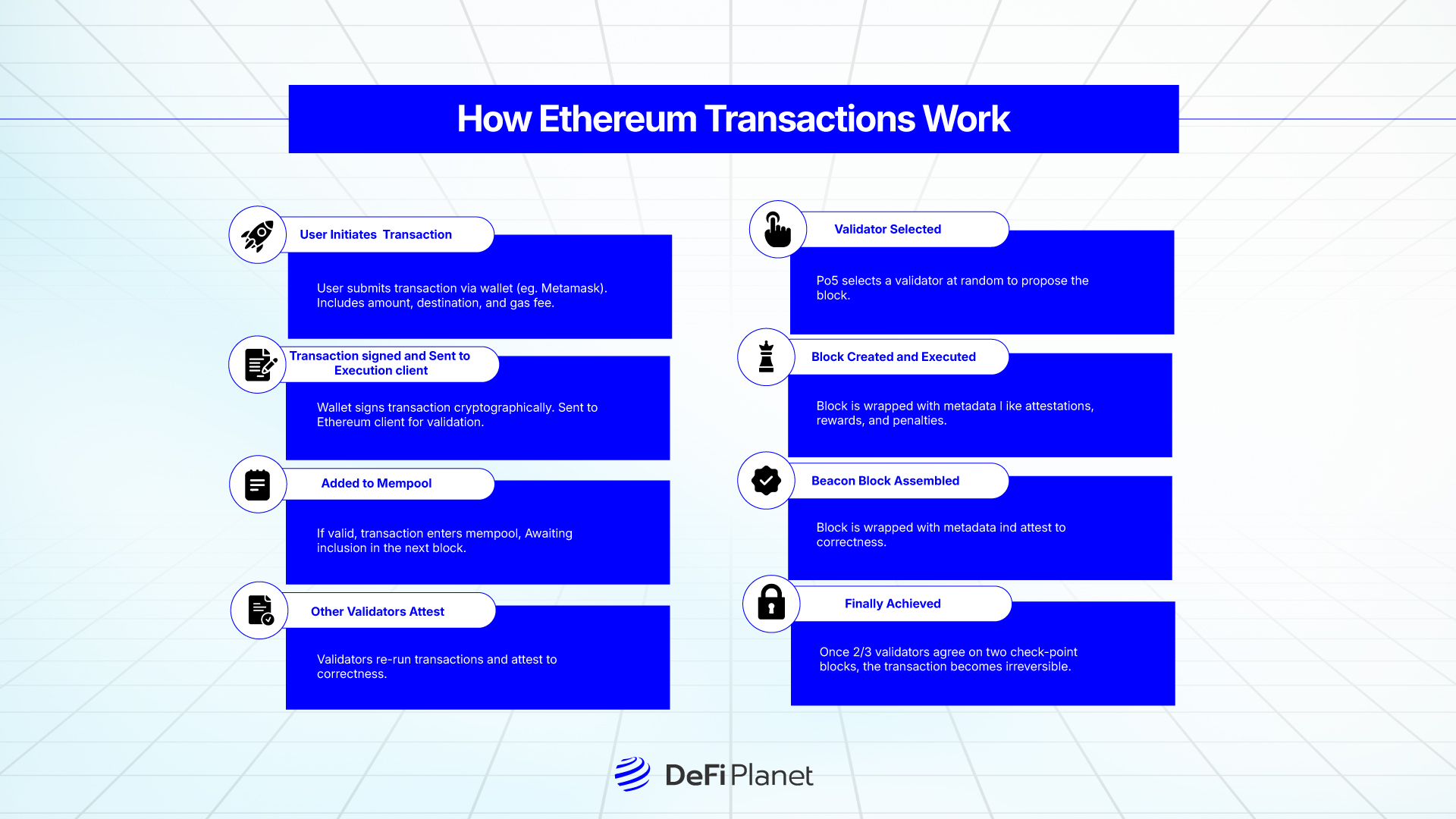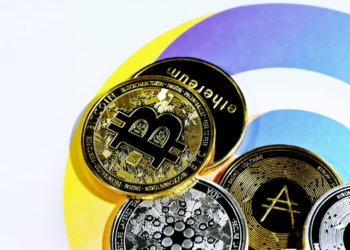Last updated on September 7th, 2025 at 10:14 pm
Blockchain records are designed to be immutable—once a transaction is confirmed, it cannot be reversed or deleted. This unchangeable nature is a cornerstone of Ethereum’s capability to power DeFi. Its biggest innovation, smart contracts, ensure a trustless system because it can guarantee that no single authority can alter the transaction history.
So for Ethereum, this immutability is a strength. But in practice, it also presents a challenge. As scams and hacks continue to plague the DeFi sector, there is growing debate over whether Ethereum should support some form of “undo” mechanism—similar to features found in traditional digital systems. Essentially, transactions can be reversed in extreme cases, such as massive hacks, critical bugs, or governance decisions.
Before exploring whether this is possible, it’s important to understand how Ethereum transactions work.
How Ethereum Transactions Work
An Ethereum transaction begins when a user initiates it through a wallet, setting gas fees, which include a base fee and a tip for validators. The transaction is digitally signed and submitted to an Ethereum execution client, which verifies its validity.
If valid, it is added to the local mempool—a temporary queue of pending transactions—and broadcasted across the network. Some users may choose to send their transactions directly to specialized block builders like Flashbots to optimize execution and avoid frontrunning.
A randomly selected validator then assembles a set of transactions into a block, executes them, and updates the global state. This block is wrapped in a beacon block, which contains attestations, penalties, and rewards—essential components for reaching consensus across the network.
Other validators re-execute the block’s transactions to confirm accuracy before attesting to its validity. Once two-thirds of all validators agree on two consecutive checkpoint blocks, the transactions are considered finalized and irreversible.
Finality in Ethereum ensures that a transaction cannot be undone without a significant financial penalty. Validators vote on checkpoint blocks, and when two-thirds of staked ETH supports a pair, the earlier block becomes finalized.

Reverting a finalized block would require an attacker to burn or lose control of at least one-third of all staked ETH, making such attacks economically impractical.
Theoretical Methods for Reversing Transactions
Though reversing Ethereum transactions is highly complex and contentious, it strikes at the core of decentralization and immutability, several theoretical methods have been proposed or debated in situations where reversal might be deemed necessary. Here are some of them:
1. State Reversions: Rolling Back the Blockchain
A state reversion involves resetting the blockchain to a previous state before a specific set of transactions occurred, effectively “erasing” those transactions from the ledger. This process, often referred to as a “rollback,” is technically challenging and philosophically controversial.
Implementing a rollback would require a hard fork, creating a new version of the blockchain that excludes the undesired transactions. However, such actions compromise the principle of immutability, a foundational aspect of blockchain technology.
For instance, following the Bybit hack, Ethereum developers ruled out a rollback due to technical infeasibility and the potential risks to the network’s integrity.
2. Miner Extractable Value (MEV) and Transaction Reordering
Miner Extractable Value (MEV) refers to the maximum profit miners can extract from reordering, including, or excluding transactions within a block. While MEV is often associated with arbitrage opportunities and front-running in DeFi applications, it theoretically could be used to “undo” specific transactions by manipulating their order or inclusion in blocks.
In theory, MEV could be used to reverse or “undo” transactions by reshuffling how they appear in a block. However, doing this in practice is nearly impossible and comes with serious risks. If miners had the power to alter transactions at will, it could shake trust in the network and lead to centralization, where only a few powerful players control what happens.
3. Social Consensus and Governance Proposals
In decentralized networks like Ethereum, the community can intervene through social consensus and governance mechanisms to address transaction reversals.
This process typically involves proposing Ethereum Improvement Proposals (EIPs), which are design documents providing information or describing new features for Ethereum.
“The DAO hack” in 2016 serves as a notable example.
The Decentralized Autonomous Organization (DAO) was designed as a decentralized venture capital fund, allowing investors to vote on which projects to fund. It quickly gained popularity, raising around $150 million in Ether (ETH) through a token sale, showing the community’s strong belief in decentralized decision-making.
But in June 2016, a flaw in The DAO’s smart contract was exploited, and about 3.6 million ETH, worth roughly $60 million at the time, was stolen. This wasn’t just a financial disaster; it also shook confidence in Ethereum’s security and future.
To fix the situation, the Ethereum community proposed a hard fork, which would undo the hack and return the stolen funds. This was controversial but despite the debate, the hard fork was carried out, splitting Ethereum into two blockchains: Ethereum (ETH), which reversed the hack, and Ethereum Classic (ETC), which kept the original chain unchanged.
This event exposed deep disagreements about blockchain governance and whether intervention should ever be allowed. While the fork restored lost funds, it set a precedent that still sparks debate today.
Since then, Ethereum has faced other security threats, especially in DeFi, where smart contract vulnerabilities have led to massive losses. High-profile hacks, such as the Ronin Bridge exploit ($620M stolen) and the Poly Network breach ($610M stolen), highlight Ethereum’s vulnerability as a prime target for attacks. Unlike The DAO hack, which was resolved with a hard fork, recent security breaches have been addressed through governance votes, security upgrades, and even negotiations with hackers.
Risks and Implications of Allowing Transaction Reversals
One of the reasons why the DAO fork was very controversial was because of the risks that come with it. Allowing transaction reversals on Ethereum carries significant risks that go against the very core principles of blockchain technology.
Erosion of Trust in Decentralization
Ethereum’s appeal lies in its trustless design. If reversals became common, users and developers could lose confidence in the finality of transactions. A blockchain that can be changed by community consensus risks becoming more like a permissioned network where trust in human decision-making replaces code-based certainty.
Opening the Door to Government and Centralized Interventions
If the community can reverse hacks, it raises concerns about external influence. Could governments or regulators demand rollbacks tied to sanctions, investigations, or financial disputes? Once the door is open, Ethereum may be pressured into making politically motivated changes—undermining its neutrality.
Impact on Developer Confidence and Platform Security
Smart contract developers rely on Ethereum’s immutability when deploying code. If they can’t trust that transactions are final, it discourages innovation and increases legal and operational uncertainty. Worse, rollback mechanisms could be exploited by bad actors trying to manipulate governance or extract concessions.
Final Thoughts
Technically, Ethereum transactions can be reversed, but only under extreme circumstances. Blockchain forks, governance interventions, and state reversion mechanisms have shown that transaction history is not entirely immutable when the community decides intervention is necessary.
The bigger question is whether Ethereum should allow transaction reversals. On one hand, rolling back transactions in cases of large-scale hacks or exploits could enhance security and protect users from devastating losses. On the other hand, allowing reversals undermines the core principle of not allowing anyone, whether a government, corporation, or group of validators to alter the blockchain at will.
Ultimately, the Ethereum community must decide whether setting a precedent for future interventions is worth the risk. If transactions can be reversed whenever a crisis occurs, Ethereum could start resembling traditional financial systems, where central authorities hold significant power. But if immutability remains an unshakable principle, users must accept that blockchain transactions are final, even in cases of fraud or loss.
Disclaimer: This article is intended solely for informational purposes and should not be considered trading or investment advice. Nothing herein should be construed as financial, legal, or tax advice. Trading or investing in cryptocurrencies carries a considerable risk of financial loss. Always conduct due diligence.
If you would like to read more articles like this, visit DeFi Planet and follow us on Twitter, LinkedIn, Facebook, Instagram, and CoinMarketCap Community.
Take control of your crypto portfolio with MARKETS PRO, DeFi Planet’s suite of analytics tools.”




















